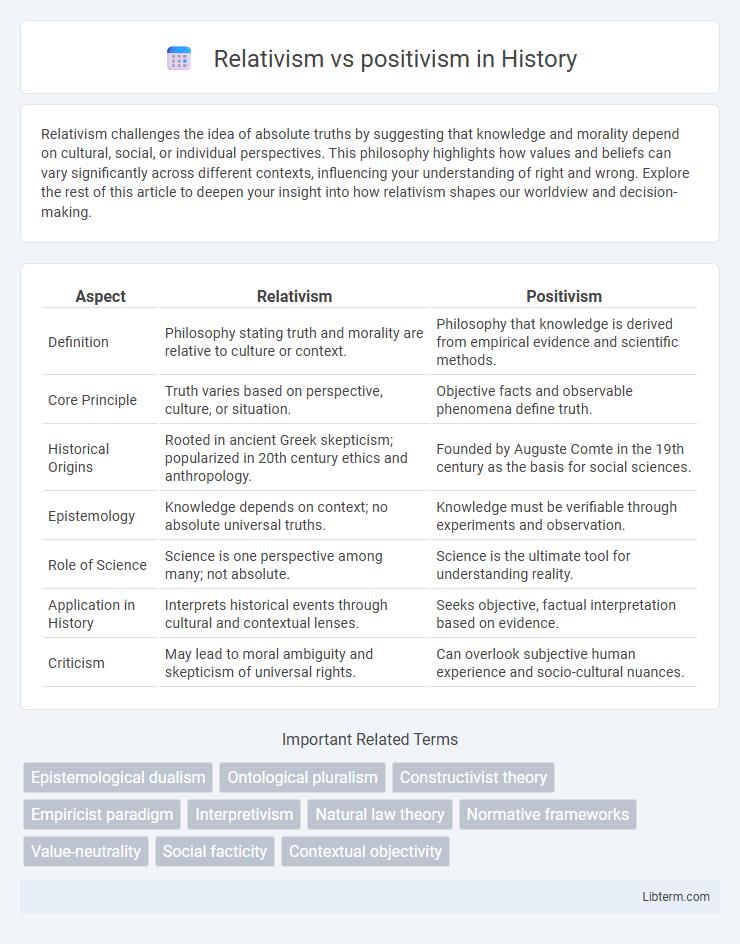Relativism challenges the idea of absolute truths by suggesting that knowledge and morality depend on cultural, social, or individual perspectives. This philosophy highlights how values and beliefs can vary significantly across different contexts, influencing your understanding of right and wrong. Explore the rest of this article to deepen your insight into how relativism shapes our worldview and decision-making.
Table of Comparison
| Aspect | Relativism | Positivism |
|---|---|---|
| Definition | Philosophy stating truth and morality are relative to culture or context. | Philosophy that knowledge is derived from empirical evidence and scientific methods. |
| Core Principle | Truth varies based on perspective, culture, or situation. | Objective facts and observable phenomena define truth. |
| Historical Origins | Rooted in ancient Greek skepticism; popularized in 20th century ethics and anthropology. | Founded by Auguste Comte in the 19th century as the basis for social sciences. |
| Epistemology | Knowledge depends on context; no absolute universal truths. | Knowledge must be verifiable through experiments and observation. |
| Role of Science | Science is one perspective among many; not absolute. | Science is the ultimate tool for understanding reality. |
| Application in History | Interprets historical events through cultural and contextual lenses. | Seeks objective, factual interpretation based on evidence. |
| Criticism | May lead to moral ambiguity and skepticism of universal rights. | Can overlook subjective human experience and socio-cultural nuances. |
Understanding Relativism: Core Principles
Relativism asserts that truth and morality are context-dependent, varying across cultures, societies, and historical periods, rejecting absolute or universal standards. It emphasizes the importance of individual perspectives and cultural norms in shaping knowledge, contrasting sharply with positivism's reliance on empirical data and observable facts for objective truth. Relativism's core principle lies in the idea that all viewpoints hold validity within their specific frameworks, challenging the notion of fixed, universal truths upheld by positivist philosophy.
The Foundations of Positivism
The foundations of positivism rest on the principle that knowledge is derived from empirical evidence and logical reasoning, emphasizing observable phenomena as the sole basis for understanding reality. Positivism rejects metaphysical speculation, advocating for a scientific approach to social and natural sciences through systematic observation and experimentation. In contrast to relativism, which asserts that truth varies based on cultural or individual perspectives, positivism upholds objective, universal truths grounded in measurable facts.
Epistemological Differences: Relativism vs Positivism
Relativism posits that knowledge is context-dependent and varies with cultural, historical, or individual perspectives, rejecting absolute truths. Positivism asserts that objective knowledge can be attained through empirical observation and scientific methods, emphasizing universal laws and facts. These epistemological differences highlight relativism's focus on subjective interpretation versus positivism's commitment to observable, measurable reality.
Historical Development of Both Philosophies
Relativism originated in ancient Greek philosophy, particularly through Sophists who challenged absolute truth by emphasizing the subjective nature of knowledge and truth. Positivism emerged in the 19th century with Auguste Comte, advocating for scientific observation and empirical data as the sole sources of valid knowledge, thus rejecting metaphysical speculation. Both philosophies evolved through debates on epistemology, with relativism questioning objective standards and positivism establishing empirical criteria for truth in historical context.
Key Thinkers: Relativists and Positivists
Relativism, championed by thinkers such as Friedrich Nietzsche and Richard Rorty, argues that knowledge and truth are culturally and contextually dependent, rejecting universal standards. Positivism, founded by Auguste Comte and further developed by Emile Durkheim, emphasizes empirical evidence and scientific methods as the sole sources of authentic knowledge. These opposing perspectives shape debates in epistemology, influencing social sciences, ethics, and legal theory.
Implications for Scientific Inquiry
Relativism challenges the universality of scientific truths by asserting that knowledge is context-dependent and influenced by cultural or social perspectives, which can limit objective interpretations and reproducibility in scientific inquiry. Positivism emphasizes empirical observation, measurement, and verification, advocating for objective knowledge based on observable phenomena and scientific methods. The tension between relativism and positivism impacts the validity, reliability, and scope of scientific claims, shaping how researchers approach hypothesis testing, data analysis, and theory development.
Truth and Objectivity: Competing Perspectives
Relativism asserts that truth is subjective and varies across cultures, perspectives, or contexts, denying absolute objectivity. Positivism emphasizes empirical evidence and observable phenomena as the foundation for objective truth, advocating universal laws and scientific verification. This fundamental divergence shapes debates in philosophy and social sciences regarding the nature of reality and knowledge validation.
Critiques of Relativism
Critiques of relativism emphasize its potential to undermine objective truth and moral standards by suggesting that all viewpoints are equally valid, which can lead to ethical ambiguity and cultural paralysis. Scholars argue that relativism fails to provide a stable framework for resolving conflicts or establishing universal principles, thereby weakening the foundation of legal and scientific inquiry. Positivism, by contrast, upholds empirical evidence and observable facts as the basis for knowledge, promoting consistency and replicability in understanding social phenomena.
Challenges to Positivism
Positivism faces significant challenges from relativism, which questions the notion of objective, universal truths by emphasizing the context-dependent and subjective nature of knowledge. Critics highlight positivism's limitations in addressing social phenomena and human experiences that cannot be quantified or empirically verified, such as cultural values, beliefs, and ethical judgments. This epistemological conflict underscores the difficulty of applying rigid scientific methods to complex, interpretive aspects of social reality, prompting calls for more pluralistic or interpretivist approaches.
Contemporary Applications and Relevance
Relativism challenges universal truths by emphasizing the context-dependent nature of knowledge, influencing contemporary debates in ethics and cultural studies where subjective perspectives are prioritized. Positivism, with its foundation in empirical observation and scientific methods, remains central in fields like sociology and legal studies, driving policy formulation through data-driven analysis. Current interdisciplinary research often blends these approaches to address complex social phenomena by balancing empirical evidence with cultural relativism.
Relativism Infographic

 libterm.com
libterm.com